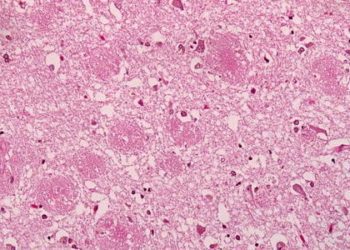Midlife vascular risk factors linked with higher brain amyloid in later life
1. In this prospective cohort study, the presence of vascular risk factors during midlife were associated with higher brain amyloid in later life.
2. Higher midlife BMI was associated with higher amyloid burden in later life.
Evidence Rating Level: 2 (Good)
Study Rundown: Many preclinical studies have found evidence of an association between vascular health and Alzheimer’s Disease (AD). However, the nature of the relationship remains unclear. As such, this multicenter, prospective cohort study sought to determine if vascular risk factors in mid or late life are associated with amyloid content—and thus AD—in the cerebral cortex. The results showed that patients with 2 or more vascular risk factors in midlife were more likely to have higher amyloid burden, as determined by non-invasive imaging, later in life when compared to those without risk factors. Vascular risk factors in later life failed to reach significance for an association with amyloid burden. In particular, high BMI during midlife was independently associated with a high later life amyloid burden.
While this study lends support to the hypothesis that vascular health and AD pathogenesis may be directly linked, lack of statistical power leaves many important questions unanswered. For instance, while the incidence of AD is thought to be equal among sexes, the true prevalence is enriched among women. This phenomenon has led many investigators to hypothesize that AD may be driven by an intrinsic biological mechanism. One (of many) way in which men and women differ is in vascular health. However, this study was unable to resolve the interaction between sex and vascular health and their shared impact on the pathogenesis of AD. Doing so would have greatly added to the understanding of AD. All in all, this study sheds light on the association between AD and vascular health, and will hopefully inspire future studies to investigate this linkage in more depth.
Click to read the study, published in JAMA
Relevant Reading: Stroke risk interacts with Alzheimer’s disease biomarkers on brain aging outcomes
In-Depth [prospective cohort]: Participants in the Atherosclerosis Risk in Communities (ARIC) Study were recruited at a mean age of 52 and followed until 76, when Florbetapir PET imaging was undertaken. 322 out of 346 patients who underwent imaging were sorted into low or high amyloid burden groups using the median Standardized Uptake Value Ratios (SUVR) of 1.2. Those with 2 or more vascular risk factors in midlife were more likely to have high amyloid burdens compared to those with none (Difference of 30.4%; CI95 16.4%-44.3; OR 2.88; CI95 1.46 to 5.69). Each additional vascular risk factor conferred an increased Odds Ratio of 1.41 (CI95 1.09-1.83). Have 2 or more late life vascular risk factors did not reach statistical significance in amyloid burden compared to having 0 risk factors (p > 0.05). Elevated midlife BMI was associated with having a high amyloid burden (OR 2.06; CI95 1.16-3.65), but not other vascular risk factor or any late life vascular risk factor reached significance. No interactions between vascular risk factors and race, sex, or APOE4 status were able to reach statistical significance for high amyloid burden (p > 0.05). Sensitivity analyses using SUVR cutoffs of 1.10 or 1.11 did not alter the results significantly.
Image: PD
©2017 2 Minute Medicine, Inc. All rights reserved. No works may be reproduced without expressed written consent from 2 Minute Medicine, Inc. Inquire about licensing here. No article should be construed as medical advice and is not intended as such by the authors or by 2 Minute Medicine, Inc.









